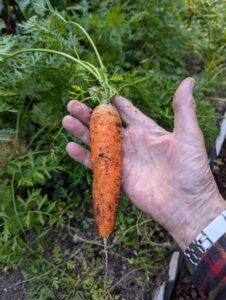Our family always has a blessing at meals. This has been a common practice throughout both Jewish and Christian history – Deuteronomy 8:10, Luke 24:30, Acts 27:35…. In the Lord’s prayer, Jesus instructs us how to pray… “give us each day our daily bread…”. Gratefulness is at the root of our Christian faith and heritage. It is also part of the rootedness of the native American tradition.
Creation’s Corner #29 introduced you to the life of the Potawatomi through the words of Robin Wall Kimmerer in Braiding Sweetgrass: Indigenous Wisdom, Scientific Knowledge, and the Teaching of Plants. Her words that follow, from the chapter titled “The Honorable Harvest”, have blessed me as I consider the nature of my gratefulness for my food and beyond. In this chapter, Robin Kimmerer is on a search for wild leeks to bless her family’s dinner table. She bears a basket to carry her leeks home. She lives close to the land and her larder is filled with what she can gather. For most of us, our larder is filled with visits to the supermarket. Our loss of connection with Creation has had profound consequences. We no longer “know” what feeds us and the life sacrifice that is paid!
“…I am the woman with the basket, and how I fill it is a question that matters. If we are fully awake, a moral question arises as we extinguish the other lives around us on behalf of our own. Whether we are digging wild leeks or going to the mall, how do we consume in a way that does justice to the lives that we take?
In our oldest stories, we are reminded that this was a question of profound concern for our ancestors. When we rely deeply on other lives, there is an urgency to protect them…. The cultural landscape may have changed, but the conundrum has not – the need to resolve the inescapable tension between honoring life around us and taking it in order to live is part of being human.
The leeks today are twice the size they were on my first visit and the scent of onions is strong where the deer has bruised the leaves. I pass by the first clump and kneel by the second. Once again, I quietly ask permission.
Asking permission shows respect for the personhood of the plant, but it is also an assessment of the well-being of the population. Thus I must use both sides of my brain to listen to the answer. The analytic left reads the empirical sign to judge whether the population is large and healthy enough to sustain a harvest, whether it has enough to share. The intuitive right hemisphere is reading something else, a sense of generosity, an open-handed radiance that says take me, or sometimes a tight-lipped recalcitrance that makes me put my trowel away. I can’t explain it, but it is a kind of knowing that is for me just as compelling as a no trespassing sign….
The traditional ecological knowledge of indigenous harvesters is rich in prescriptions for sustainability. They are found in native science and philosophy, in lifeways and practices, but most of all in stories, the ones that are told to help restore balance, to locate ourselves once again in the circle.
Cautionary stories of the consequences of taking too much are ubiquitous in native cultures, but it’s hard to recall a single one in English. Perhaps this helps explain why we seem to be caught in a trap of overconsumption, which is as destructive to ourselves as to those we consume.
Collectively, the indigenous canon of principles and practices that govern the exchange of life for life is known as the Honorable Harvest. They are rules of sorts that govern our taking, shape our relationships with the natural world, and rein in our tendency to consume — that the world might be as rich for the seventh generation as it is for our own. The details are highly specific to different cultures and ecosystems, but the fundamental principles are nearly universal among peoples who live close to the land.
I am a student of this way of thinking, not a scholar. As a human being… I must struggle to participate in the Honorable Harvest. So I lean in close to watch and listen to those who are far wiser than I am. What I share here, in the same way they were shared with me, our seeds gleaned from the fields of their collective wisdom, the barest surface, the moss on the mountain of their knowledge. I feel grateful for their teachings and responsible for passing them on as best I can….
The guidelines for the Honorable Harvest are not written down, or even consistently spoken of as a whole — they are reinforced in small acts of daily life. But if you were to list them, they might look something like this:
- Know the ways of the ones who take care of you, so that you may take care of them.
- Introduce yourself. Be accountable as the one who comes asking for life.
- Ask permission before taking. Abide by the answer.
- Never take the first. Never take the last.
- Take only what you need.
- Take only that which is given.
- Never take more than half. Leave some for others.
- Harvest in a way that minimizes harm.
- Use it respectfully. Never waste what you have taken.
- Share.
- Give thanks for what you have been given.
- Give a gift, in reciprocity for what you have taken.
- Sustain the ones who sustain you and the earth will last forever.”
 There is so much more that could be said from this chapter and the book Braiding Sweetgrass. But now is the time to search ourselves. What is our personal relationship with Creation? Are we primarily “takers” who may thank the Lord for the “gifts” we receive from Him but ignore the non-human persons who have given their all? It is much easier to connect with Creation when the carrot you pull is one that you have planted and tended. A relationship of reciprocity is present. Most of us are caught in a “system” of disconnect. How do you recognize the personhood of a carrot in a bundle at the local Safeway?
There is so much more that could be said from this chapter and the book Braiding Sweetgrass. But now is the time to search ourselves. What is our personal relationship with Creation? Are we primarily “takers” who may thank the Lord for the “gifts” we receive from Him but ignore the non-human persons who have given their all? It is much easier to connect with Creation when the carrot you pull is one that you have planted and tended. A relationship of reciprocity is present. Most of us are caught in a “system” of disconnect. How do you recognize the personhood of a carrot in a bundle at the local Safeway?
The tribes are now gathering again at Pacific Rim Institute to dig camas bulbs for ceremonial meals. A sovereign food garden is in process and other opportunities are being explored that will allow them to connect to their historic sacred land. Their sense of place draws them back to the soil. It is infinitely different than a visit to the supermarket.
Our prayer: “Lord Jesus, we take so much for granted! We know our clean air, clean water, our food, and our shelter are provided by You as well as the lives of other creatures that allow us to live. In our complicated world that often disconnects us from the true fabric of life, help us, we pray, to incorporate the principles of the Honorable Harvest into our lives. Amen
Thanks for listening.
— Joe Sheldon
Direct comments to Joe Sheldon at jksheldon43@gmail.com
If you would like to receive additional information on Creation care, notices of special events, Creation walks I lead, etc. please contact me at the above address and I will add you to my e-mail list. Your comments are welcome.


